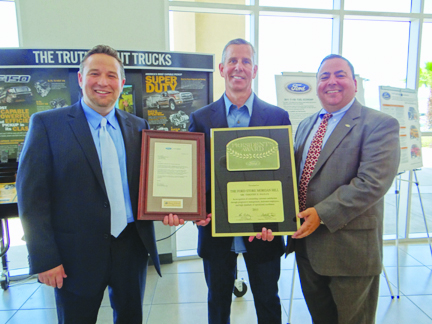Bolstered by steadily rising automobile and RV sales, as well as the perpetual need for gasoline despite its high price, sales tax revenues in Morgan Hill are approaching the all-time peak of 2007 after dropping off heavily during the recent recession.
With the new Honda Morgan Hill dealership set to complete its first year of sales at the end of November, the Ford Store Morgan Hill’s sales outpacing regional dealers of the same brand, a new RV dealer and another one moving to town soon, the city’s revenues from sales tax (including transportation and all sales categories) tallied about $1.9 million in the second quarter of 2012.
That’s about 19 percent higher than the $1.6 million collected during the same time last year, according to a city staff report. The first quarter of 2012 dwarfed the same period of 2011 as well, with an 18 percent jump in sales tax revenues of $1.7 million.
“All that (increase) is coming from one category – transportation,” which includes automobile, RV and gasoline sales, City Manager Ed Tewes said. Other categories of sales have remained flat, except for business-to-business sales which have seen slight increases in recent months.
Although Tewes cautioned that transportation sales are “volatile” in general, the rise in public revenue from those sales is by design as part of the city’s economic development strategy the last couple years has been to recruit new car and RV dealers.
Honda Morgan Hill moved to Morgan Hill, near U.S. 101 and Dunne Avenue, from Gilroy last November. McMahon’s RV opened a new sales shop on Condit Road in June, next door to Pan Pacific RV whose lot is currently undergoing construction improvements. A third RV dealer – Family RV – plans to move to north Morgan Hill by the end of this year.
Tewes also noted that more than half of all new car sales in south Santa Clara County took place in Morgan Hill in the last quarter. Gilroy dealers used to sell the most new cars in the region.
Councilmember Larry Carr said at least that part of the economic development strategy has started to pay off.
“We have specifically said that’s a sales tax category we would like to go after, and we have seen some positive results from it,” Carr said.
Honda Morgan Hill general manager Michelle Glaznap said the dealership’s sales are up by a “significant” amount since moving from Gilroy, but she declined to offer specific numbers.
Though not new to town, the Ford Store Morgan Hill on Condit Road near U.S. 101 has seen skyrocketing sales this year, according to president and owner Tim Paulus. Year-to-date, the store’s sales of new cars are up 43 percent over last year, and used-car sales are up 28 percent.
That increase is due to general improving market conditions, as well as to a growing interest in Ford’s new electric, hybrid and fuel-efficient vehicles, Paulus said.
“Ford has really worked on their fleet to improve the fuel economy,” Paulus said. “Because of the high gas prices, a lot of people are coming in and trading to get the higher fuel economy.” Those prices averaged about $4.58 per gallon – the highest in the nation – as of Monday, according to the website californiagasprices.com.
The Ford Store’s sales went up last year over the previous year as well, by about 50 percent, Paulus said.
Paulus added that the Morgan Hill dealership is now the top-selling Ford dealer in the Bay Area.
In 2011, total sales tax receipts in Morgan Hill numbered about $6.3 million, according to city staff. Earlier this year, city staff projected collecting about $6.6 million in sales tax revenues for the 2012-2013 fiscal year – slightly lower than that collected in 2007 when real estate was booming and consumers were flush with credit.
The city collects 1 percent of all taxable transportation-related, general retail, business-to-business, construction and food products sales made in the city limits. The revenue funds basic services including public safety, street repairs and construction, and parks maintenance.
Sales tax is the city’s second-largest source of general fund revenues, with property taxes on top, generating about $7.2 million annually, city staff said.
The rise in sales tax revenues in Morgan Hill far outpaces the positive revenue growth trend in the nine-county Bay Area, which collectively saw 9.3 percent increase in sales tax in the second quarter of 2011 since the previous year, according to the California State Board of Equalization.
Santa Clara County’s sales tax revenues rose by about 12 percent during that one-year timeframe.
“Consumers spending more in California is a positive indicator of continuing economic recovery,” said Betty Yee, first district member of the state BOE. “This is an encouraging sign for struggling families, communities, and businesses throughout our state.”
Annually through second quarter
2012: $3.6 million
2011: $3 million ($6.3 million entire year)
2010: $2.6 million ($5.4 million entire year)
2009: $2.2 million ($4.8 million entire year)
2008: $3.2 million ($6.1 million entire year)
2007: $3.4 million ($6.7 million entire year)
2006: $3.1 million ($6.3 million entire year)








